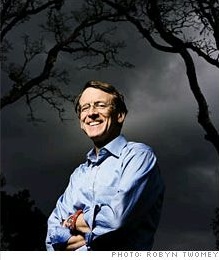 How do you know when one of the world’s most respected investment firms has veered off path and bet wrong?
How do you know when one of the world’s most respected investment firms has veered off path and bet wrong?
That’s the crux of the question raised by a piece in this month’s Fortune entitled “Kleiner bets the farm” that puts Kleiner Perkins Caufield & Byers under the lens for its recent investment decisions.
The firm’s fortunes have emerged as the subject of discussion in Silicon Valley, now that the firm has largely abandoned the Internet investments that made it famous. “Several Valley investors who monitor startups tell me they don’t bother sending Web-oriented entrepreneurs to pitch Kleiner anymore; they say the firm just doesn’t seem interested,” writes Fortune’s Adam Lashinsky, citing one off-the-record source. “If they’re wrong, it’ll be the end of Kleiner Perkins.”
Lashinsky is a veteran reporter, held several interviews with the firm, and gave it a fair chance to respond to the critique. You should read the whole story, because Kleiner has its perspective — that is, that the investment cycle is long, and the firm’s partners say they believe strongly in the new direction of the firm. They say it will harvest investments made in areas such as clean technology and biotech drugs.
The signficance of the piece, however, is that it’s one of the first really hard-hitting piece by a credible reporter who appears to want to call the end of Kleiner’s era of dominance. Sure, questions have been raised about the firm before. Several years ago, valley insiders starting asking how long it could be led by the visionary directives of John Doerr, even as other high-performing investors (Vinod Khosla, Kevin Compton) left the firm. But with Kleiner’s big bet on Google in 1999, and the billions the firm reaped from that and other earlier investments, it was difficult to criticize the firm without giving it a few more years to generate another killer IPO.
Amost a decade later, still without one, the number of skeptics are growing. Lashinsky quotes one source: “What the hell happened to them?” It’s something of a rhetorical question, since Kleiner has actually remained in the headlines, announcing high profile moves such as partner Al Gore, opening a $500 million special fund for green investments, and making high profile investments like the Think America electric vehicle. Kleiner Perkins has staked a lot of its money and even more of its reputation on cleantech being the next big thing.
The firm is betting on some bold, meaningful ideas. None of them are safe. Fuel cells are a notoriously difficult technology, but Kleiner Perkins has bet big on Bloom Energy; ditto for the cellulosic ethanol technology of Mascoma, wacky (and not yet terribly popular) scooters from Segway, and the high-performance electric cars of Tesla Motors competitor Fisker Automotive. Adding it all up, one might begin to think Doerr has lost control of his emotions and begun investing more like a tree-hugger than a tycoon.
The real story, however, is a bit more complex. Lashinky mentions Terralliance, a Kleiner Perkins energy investment that has taken up to a billion dollars. While the firm has spent plenty of time talking up renewable energy portfolio companies like Ausra, it never mentions Terralliance. The ostensible reason is that the company is in stealth mode. But while Terralliance is an energy play, it’s no feel-good green investment; it’s an oil wildcatter that has already drilled up to 100 wells. Another Kleiner Perkins investment not mentioned in the Fortune article is GloriOil, which helps extract more oil from mature wells.
 Those investments, which might horrify environmentalists, should comfort the investors behind Kleiner Perkins. Everyone knows what happens to big businesses that put social responsibility over profits: Once they face real competition, they often fall short. (See the six-month drop in Whole Foods Market’s stock price.) Kleiner Perkins, it would seem, still has a firm enough grasp on capitalist realities, and Doerr, who won’t comment on Terralliance, could be generating noisy cleantech PR as an investment strategy as much as for personal global warming sentimentality.
Those investments, which might horrify environmentalists, should comfort the investors behind Kleiner Perkins. Everyone knows what happens to big businesses that put social responsibility over profits: Once they face real competition, they often fall short. (See the six-month drop in Whole Foods Market’s stock price.) Kleiner Perkins, it would seem, still has a firm enough grasp on capitalist realities, and Doerr, who won’t comment on Terralliance, could be generating noisy cleantech PR as an investment strategy as much as for personal global warming sentimentality.
And outside cleantech, Kleiner Perkins is still making plenty of investments, albeit with less fanfare. Although it’s not betting big on Web 2.0, it has redirected $100 million to iPhone applications, and with the hiring of Bing Gordon, it appears interested in gaming. Along with high-profile biotech deals like Pacific BioSciences, it’s also quietly investing in infrastructure in China, including a profitable shirt factory.
If anything, Kleiner appears to have turned its attention away from quick wins to long-term, but potentially massive plays — companies that could become even bigger than the firm’s most recent grandslam, Google. In the energy industry, the $4 trillion grandaddy of all markets, that’s not so hard to imagine.
(Image source for John Doerr: Fortune Magazine)

